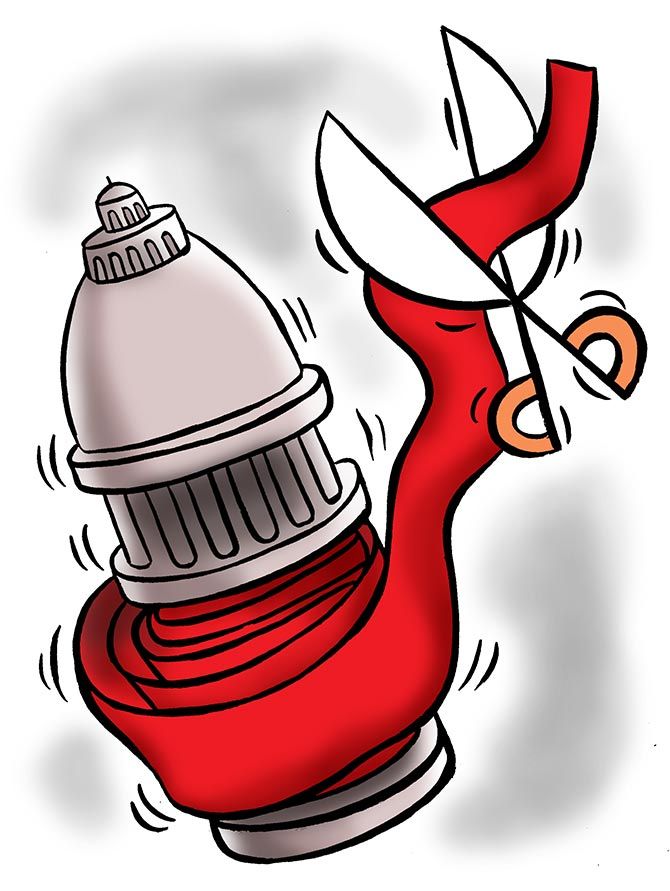Just 5 departments account for about 88 per cent of the Union government's civilian employees.
A leaner bureaucracy will help Modi keep his promise of maximum governance with minimum government, says A K Bhattacharya.
Illustration: Uttam Ghosh/Rediff.com

Has the strength of the Union government's civilian employees gone up or declined under Narendra Modi as prime minister?
Given Modi's promise of maximum governance with minimum government, one would expect that number to decline.
Indeed, at the end of the first year of the Modi government, the total number of civilian employees on its rolls did go down, though marginally by a little over half a per cent.
The trend was maintained at the end of the second year, too, with a further drop of 0.63 per cent in the number of employees to 3.28 million.
Surprisingly, however, the third year of the Modi government indicates a rise in its civilian manpower strength.
By the end of March 2017, the total number of civilian employees of the Union government would increase by about 8 per cent to 3.54 million.
Worse, the rising trend is expected to continue next year as well, when it would go up by 0.83 per cent to 3.57 million.
What has happened to the Modi government's commitment to make its bureaucracy leaner?
What did Modi mean by promising maximum governance with minimum government?
True, the prime minister has a slightly different understanding of the goals of maximum governance with minimum government, which according to him should be judged by the fewer number of government clearances now needed and the reduced time now taken in the movement of official files from one department to the other before a decision is taken.
But surely, the size of the bureaucracy should also be one of the criteria for judging how well the government has done in fulfilling that promise.
Take a closer look at the civilian employees' strength and a more interesting trend emerges.
Employees of the Indian Railways, whose annual budget has now been amalgamated with the Union Budget, account for almost 37 per cent of the total civilian manpower on the Union government's rolls.
Corporatise the Indian Railways, and the Union government's employees strength would decline to a more manageable strength of 2.24 million.
For this reason alone, the Modi government should move fast on converting the Indian Railways, initially, into a public sector undertaking and then gradually reduce its stake in the country's largest transporter of goods and passengers.
That step would kill many birds with one stone: Reduce the government's employee strength, force the Indian Railways to be more efficient, create a new source of divestment revenue for the central exchequer and eventually pave the way for its strategic sale, with the government retaining a stake of just 26 per cent.
Police forces account for the next largest share in total government manpower.
At about 1.1 million, their share now is 31 per cent of the total employees of the Centre. Nothing much can be done about this.
But there is no reason why the growth in the number of employees under the departments of post, revenue, and audit and accounts should continue unchecked.
The department of posts, which is now busy launching a payments bank, should consider a structure by which its existing employees base (at 0.47 million, they represented a rise of about 5 per cent in a year) could be retrained for necessary redeployment.
There is no reason why the department should not reduce its employees' strength at a time when technology is making it possible to achieve more with less people and gain the necessary cost advantage to compete with private sector courier companies.
The other puzzle is the rising number of employees in the revenue department and in the department of audit and accounts -- both under the ministry of finance.
In 2015, the number of employees in the two tax departments went up by 123 per cent and continued to grow, though by smaller margins, last year and this year.
At this rate, the total number of employees in the revenue department would be over 0.18 million by next year.
The question that needs to be answered is whether greater use of electronic modes of tax administration and scrutiny requires more people or less.
The uncomfortable fact is that just 5 departments in the Union government -- railways, police, audit and accounts, revenue and posts -- account for about 88 per cent of its total civilian employees.
If Modi takes his commitment to maximum governance with minimum government a little more seriously and holistically, his government's administrative efficiency will improve with reduced costs.
Government employees would not have many reasons to complain either -- the average salary of a civilian employee with the Union government in 2016-2017 was up by 47 per cent over what it was in 2013-2014.











